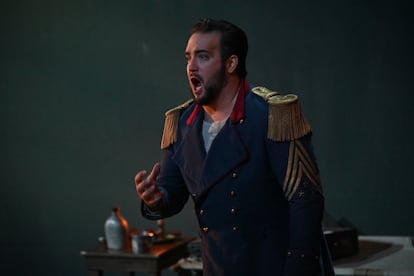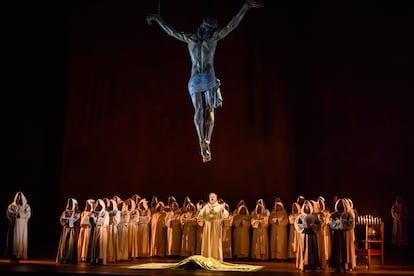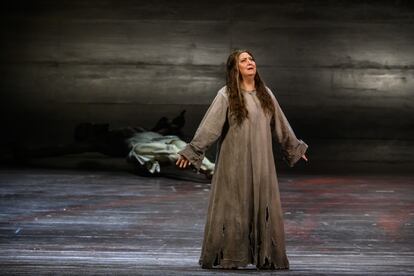The myth of The force of destinyby Giuseppe Verdi, as a cursed opera, is related to two tragic events in 1960. In early March, Leonard Warren died while singing the character of Don Carlo di Vargas during a performance at the Metropolitan Opera House in New York. The American baritone was struck down by a cerebral embolism before finishing his scene in the third act, which paradoxically begins with the exclamation “Die! Tremendous thing!” And, at the end of September, Dimitri Mitrópoulos conducted this title by Verdi, in Vienna, in his last operatic performance, as he died suddenly as a result of cardiac arrest a few weeks later. The Greek-American director had chosen to move the opera’s overture to the end of the first act, after the Marquis of Calatrava cursed his daughter Donna Leonora.
13 years ago, stage director Jean-Claude Auvray decided to revive this strange placement of Verdi’s overture. Its co-production with the Paris Opera was performed in Barcelona in 2012, and last Saturday, November 9, it returned to the stage of the Gran Teatre del Liceu. Auvray argues in the hand program that this strange placement of the overture helps to conceive the first act as a prologue, a practice that Gustav Mahler already carried out in Vienna around 1900. In reality, Mahler never directed this opera by Verdi and the idea of moving the overture was by the playwright Franz Werfel, who adapted it into German The force of destinyin November 1924, for the Vienna Volksoper. a strange wagnerization by Verdi that Fritz Stiedry (a disciple of Mahler) premiered and then tried to export without success to the Metropolitan Opera House in New York during the 1950s.
The overture, which Verdi redid for the 1869 version, makes perfect sense at the beginning, as it is a magnificent orchestral medley of the opera’s main themes. Starting with that dramatic whirlwind of destiny, in E minor, which splashes the five subsequent themes and ends up becoming, in E major, a sign of hope, which agrees with the revised ending of the opera. Fortunately, Nicola Luisotti compensated with Italianness this nonsense from the stage director, in his debut at the Liceu in Barcelona. The maestro from Viareggio, well known in Madrid as the main guest conductor at the Teatro Real, turned the overture into the most applauded number of the evening, despite the aforementioned relocation.
The Italian director knew how to find from the pit an ideal common denominator for the motley mix of the tragic, the comic and the grotesque that Verdi proposes in The force of destinybased on his rereading of the Duke of Rivas sprinkled by Schiller. A constant mixture of rigor and passion, which permeated even the accompaniment of the recitatives, and which extracted admirable details from the Gran Teatre del Liceu Symphony Orchestra. Darío Mariño’s clarinet solo stood out, at the beginning of the third act, almost a concert that Verdi wrote with Ernesto Cavallini in mind for the absolute premiere in Saint Petersburg, in 1862. The Choir of the Barcelona theater, directed by Pablo Assante, also gave a excellent performance with precise attacks, sound density, good dynamics and clear articulation, which we hear, for example, in the famous Rataplan, rataplan, della gloria at the end of the third act.

In addition to Luisotti, the orchestra and the choir, the cast was of great quality. Starting with the Italian soprano Anna Pirozzi, who was the great winner of the night with a memorable Leonora, the central character of the opera after the revision of 1869. The Neapolitan singer chisels the character, handling the vocal coloring and dynamic nuances with ease. He already shone in the first act with a heartfelt aria Me, pilgrim and orphanand added greater emotional intensity in the second act with Mother, merciful Virgin. But it was in the fourth, after an interval of almost an hour and a half without appearing on stage, where he raised the famous Peace, peace, my Godplacing ethereal notes that made you hold your breath, like his impressive attack of the high B flat in pianissimo.
The tenor Brian Jagde was an imposing Don Alvaro, for his vocal delivery and the power of his treble, but with a very limited dynamic palette, as we could hear, in September, at the Teatro Real in his interpretation of Maurizio in Adriana Lecouvreur. The American is one of the main current interpreters of this Verdi role and he shone especially in the third act with his aria Life is hell for the unhappy manwhere he found a little more flexibility and was one of the most applauded numbers. Artur Ruciński was a good Don Carlo di Vargas, just like last season with Renato in A masquerade ball. The Polish singer is an excellent Verdi baritone, but his musical delivery lacks greater psychological depth in a character who is happy hating to death. Ruciński also had his best and most applauded moment in the third act, with an exquisite performance of the aria Fatal urn. And one cannot forget the brilliance of both singers in their duets in the third and fourth acts.

The exemplary Fra Melitone by Pietro Spagnoli stood out from the rest. The Roman baritone created the only theatrical character that we saw on stage and, in addition, he vocally connected without stridency the heritage of the bel canto bass singers with the future Verdian Falstaff. The young woman mezzo Caterina Piva was also a brilliant Preziosilla, attentive to the mood demands of this frivolous popular leader who combines Ulrica with The troubadour with Oscar Masquerade ball and anticipates Bizet’s future Carmen. Bass John Relyea was a solid and resonant Padre Guardiano, although somewhat monotonous in singing. And Maestro Trabuco, led by the Granada tenor Moisés Marín, and the veteran bass Giacomo Prestia deserve a mention, whose health did not allow him to sing as Padre Guardiano, but he was a convincing Marquis de Calatrava.
Auvray’s stage production works well, despite the aforementioned relocation of the overture. Musically, it does not dispense with any number from the 1869 version of the opera. At a scenic level, it is a monumental and minimalist proposal that transfers the complex 18th-century plot of the opera to the Risorgimento and the Sexenio. Leo Castaldi’s revival has had an impact on the management of the ensembles, although the direction of actors remains very limited. However, the set design by Alain Chambon and the costumes by Maria Chiara Donato stand out for their evocation of pictorial images, with the help of lighting by Laurent Castaingt, who recreates paintings by Zurbarán or Delacroix in the second and third acts, converting the chorus Rata plan in a wink of Liberty leading the people.
Before the start of the performance, tribute was paid to the DANA victims in Valencia with a beautiful solo cello performance by The song of the birdsconducted by Òscar Alabau, cello soloist of the Gran Teatre del Liceu Orchestra. To this we should add the beautiful and hopeful A flat major, with the tremolo of the strings and the harp in pianississimo (ppp), which puts an end to this Verdi opera after so much tragedy.
‘The Force of Destiny’
Music by Giuseppe Verdi. Libretto by Francesco Maria Piave revised by Antonio Ghislanzoni. Giacomo Prestia, bajo (Marqués de Calatrava); Anna Pirozzi, soprano (Donna Leonora); Artur Ruciński, baritone (Don Carlo Di Vargas); Brian Jagde, tenor (Don Alvaro); Caterina Piva, mezzo-soprano (Preziosilla); John Relyea, bajo (Father Guardian); Pietro Spagnoli, baritone (Fra Melitone); Laura Vila, mezzo-soprano (Curra); Moisés Marín, tenor (Maestro Trabuco); Dimitar Darlev, bajo (El alcalde); Domingo Ramos, baritone (Cirujano). Choir and Symphony Orchestra of the Gran Teatre del Liceu. Musical direction: Nicola Luisotti.
Stage direction: Jean-Claude Auvray. Replacement: Leo Castaldi.
Gran Teatre del Liceu, November 9. Until November 19.

